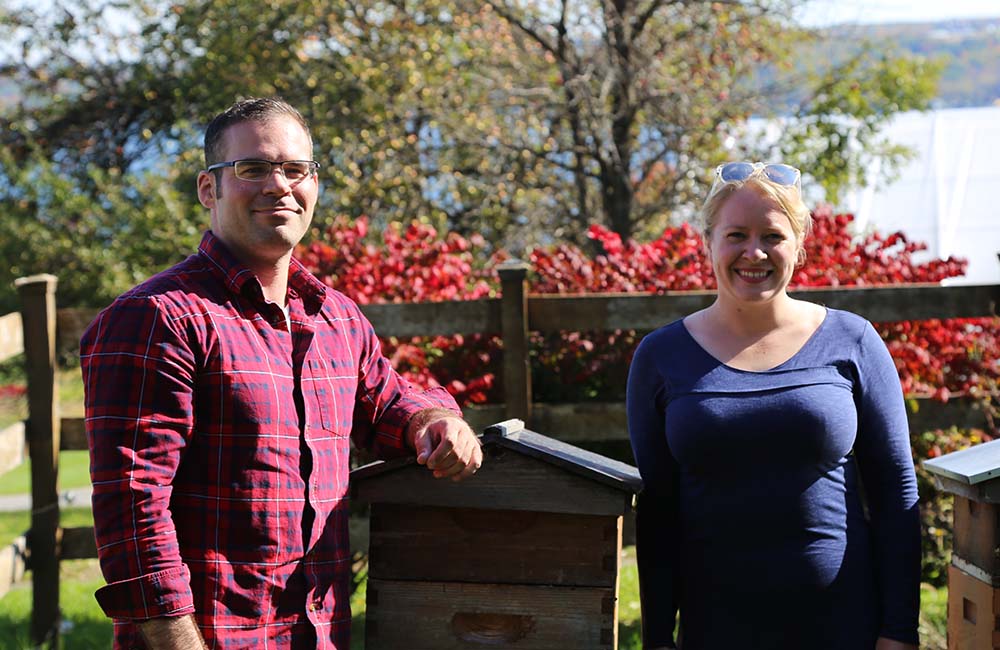
Combplex Wins $500K in 76West Clean Energy Competition
The latest achievement by a Cornellian-led startup and Rev: Ithaca Startup Works member dedicated to protecting honeybees – a $500,000 runner-up prize at the fifth annual 76West Clean Energy Competition – is creating quite the buzz in New York’s Southern Tier.
Combplex, founded by doctoral students Hailey Scofield and Nathan Oakes, former research fellows with the Cornell Atkinson Center for Sustainability, was among 19 finalists selected from 183 applicants worldwide to compete in the virtual pitch competition in mid-August.
The 76West winners – including $1 million grand prize recipient ThermoAI of Montreal, and fellow $500,000 awardees COI Energy Services (New York City) and AGreatE of Carlsbad, California – were announced by Lt. Gov. Kathy Hochul on Oct. 19 at a virtual awards ceremony, co-hosted by Empire State Development and the New York State Energy Research and Development Authority (NYSERDA).
“Because I am from upstate New York, I know the challenges this region has faced for a long time trying to stop the ‘brain drain’ and trying to keep young, talented people who want to work and stay in this area,” Hochul said, before revealing the winning startups. “76West is going to be a game changer for whoever the winners are, but also the runners-up, and all the applicants who now know about the Southern Tier.”
In addition to distributing $2.5 million in funding to the competition’s top finalists this year, 76West helps clean energy startups establish operations in the Southern Tier, gain access to early users for their technologies, and further develop the cleantech innovation ecosystem in the region. Each startup is paired with a regional business leader for mentorship and guidance leading up to the competition.
“Now that we have a prototype that is manufacturable, we are ready to start producing a larger number of devices for testing,” said Scofield, CEO of Combplex. “76West was the perfect next step in our growth—allowing us to identify, meet, and obtain quotes from contract manufacturers in the Southern Tier.”
Combplex’s 76West win is another milestone in the startup’s upward trajectory. The startup took home the $250,000 prize at last November’s inaugural Grow-NY, a business competition and development program to attract innovative, high-growth, food and agriculture startups to the Finger Lakes, Central New York, and the Southern Tier. In August, Combplex received a $256,000 National Science Foundation (NSF) Small Business Innovation Research (SBIR) Phase I award.
“The Grow-NY funding allowed us to work with two fantastic upstate New York contract engineers to help turn our lab-bench project into a real minimum viable product, and with the NSF SBIR award, we are optimizing our automatic optical system for FDA approval and preparing for our first production runs with our manufacturing partners in the region,” said Scofield. “With the 76West win, we look forward to growing our team—and our apiaries— to continue working toward our goal of using honeybee tech to incentivize sustainable agriculture and pollinator friendly practices across the United States.”
Garnering over $1 million in funding in under a year, Scofield and Oakes plan to utilize their recent wins to further develop and validate Combplex’s novel solution for eliminating Varroa mites, the leading cause of honeybee colony loss and more than $2 billion in agricultural damages in the United States annually. Their solution involves a smart bee frame equipped with a laser that identifies and eliminates these harmful parasites automatically, year-round, and completely chemical free. Combplex is aiming to open sales of their first product to beekeepers in Spring 2021.
“Destroying Varroa mites is such a major issue within the beekeeping industry that our chemical free frames and their data open up myriad opportunities for using honeybees as an economic tool to leverage sustainable growing practices in pollinator-dependent commercial agriculture” said Scofield.
The founders initially set out to create a tool to help beekeepers monitor their colonies for signs of collapse; however, while leveraging resources in Cornell’s entrepreneurial ecosystem, including eLab, Rev: Ithaca Startup Works—including the business incubator’s Napkin-to-Prototype and Prototype-to-Production hardware accelerator programs—and participation in the national I-Corps Teams program via the Upstate New York I-Corps Node, the pair discovered they could address beekeepers’ more urgent needs.
“The Cornell programs were the initial on-ramp for us to think about transitioning from Ph.D. candidates to entrepreneurs. These programs spurred us on to participate in the national I-Corps Teams program through NSF. During I-Corps, the customer discovery and cross-country travel that the NSF funding provided, allowed us to zero in on our current mite laser solution,” said Scofield.
Acknowledging the many entrepreneurial development programs and pitch competitions the startup has participated in over the years, Tom Schryver, executive director of Cornell’s Center for Regional Economic Advancement and an eLab instructor remarked: “Combplex is a role model of how to effectively leverage the robust entrepreneurial ecosystem at Cornell University. We are thrilled to see them join a growing number of high-tech, high-growth, high-impact startups that begin here and decide to put down roots and stay in the region—further strengthening a great and growing startup ecosystem in the Southern Tier.”
Through Empire State Development’s Southern Tier Soaring Upstate Revitalization Initiative, 76West winners are required to relocate to or establish a direct connection with the region, in order to develop jobs, connect with local partners, and contribute to strengthening the emerging clean energy ecosystem.
“We’re big fans of experts here in New York State, regardless of what other people think, and so we’re continuing to build our ecosystem of experts in the clean energy world right here in the Southern Tier,” said Lieutenant Governor Hochul.
A version of this story appears in the Cornell Chronicle.
